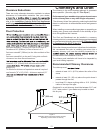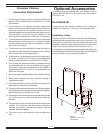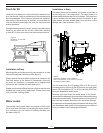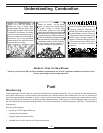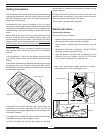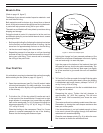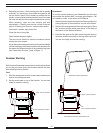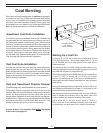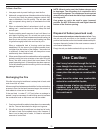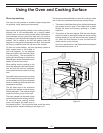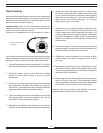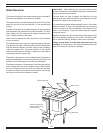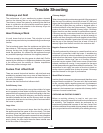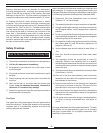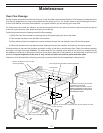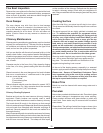
21
To Start a Coal Fire:
1. Use paper and dry wood kindling to start the re.
2. Add small, compact pieces of hardwood when the kindling
is burning hot. Keep the primary damper controls fully
open to establish a hot re quickly. The ash door also
may be opened during start-up to accelerate the initial
burn.
3. When a substantial bed of red embers is built up, start
adding coal – small amounts at a time. Keep the draft
control open.
4. Continue adding small amounts of coal until there is a
solid bed of burning coal. Do not add too much at one
time. Allow sufcient time between each small loading (at
least ve to ten minutes), so that each loading has time
to ignite thoroughly before the next load is put in.
When a substantial bed of burning coals has been
established, ll the stove to the highest possible level,
no higher than the bottom of the redoor – be careful not
to overload! A deep bed of coal will always burn more
satisfactorily than a shallow bed.
5. When most of the wood is burned and the coal is completely
ignited (usually ve to ten minutes or less after lling the
stove), the draft control should be turned down to the
proper operating level. (If the ash door has been opened,
it must be closed to prevent overring, which can severely
damage the stove.)
Recharging the Fire
If the re is burning hot and there is a deep bed of coals, add
coal a hand full at a time.
Allow enough time between each addition for the combustion
process to start. As the bank becomes larger, the amount of
coal added at a time can be increased.
If the coal bed is under 5” (12.7cm) before a recharge is
started, it may be necessary to add kindling wood to increase
the combustion level so that more coal can be added.
1. Coal never should be added unless there is a reasonably
hot re. The coal bed should be bright and vigorous.
2. If the re is burning hot and there is a deep bed of coals,
full loads of coal can be added at any time. However, if
there is not a deep bed of coals, it is best to add small
amounts of coal at rst.
NOTE: When burning coal, the redoor damper must
be kept open. The secondary air is required to aid in
burning off coal gases. The coal damper is not required
when burning wood and should be kept closed when
burning wood.
Coal grates are not to be used in upper (summer)
position. Do NOT ll rebox with coal higher than the
bottom of the redoor opening.
Disposal of Ashes (wood and coal)
Do not remove the ash pan when the stove is hot. Carry
the ash pan with one hand on the handle in the upright
position and the other on the front handle to balance the pan.
Improper disposal of ashes is the most common cause of
wood stove related res.
Empty the ash pan before ashes build up over the top.
Use Caution:
• don’t carry hot ashes through the house;
• even though the stove may be cool, the
ashes in the pan may still be hot;
• never place the ash pan on a combustible
oor;
• never leave the ashes near combustible
material or combustible liquids;
• always dispose of ashes in a closed metal
container with a tight tting lid—if an
unexpected gust of wind fan the ashes, a
re could result.



